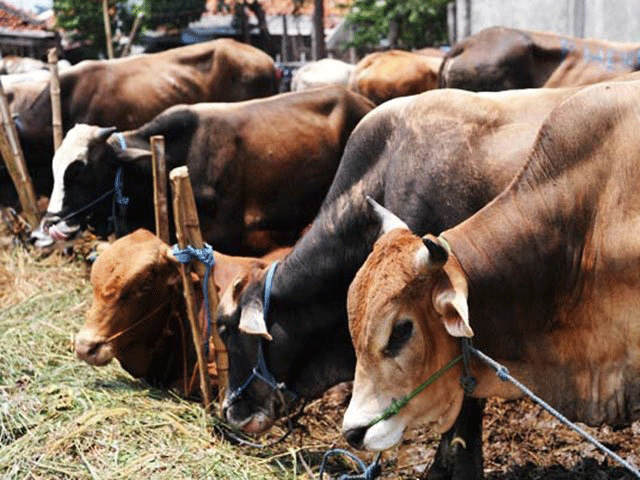Cause of concern: Livestock diseases worrisome, says UAF VC
Iqrar Ahmad says country’s milk production is very low

PHOTO: AFP
“All stakeholders, including researchers and the farming community, must make efforts to address the issue,” the vice chancellor told participants of an Internees-stakeholder Interactive Workshop arranged by the UAF Faculty of Veterinary Sciences.
“An analysis of milk production in the livestock sector reveals that an animal [on average] produces 2,000 litres of milk a year. The figure is quite low compared to developed countries where an animal produces 8,000 litres of milk per animal,” Khan said.
He said that although Pakistan was one of the largest producers of milk, per animal milk production was quite low. “This prevents the farming community from getting the due reward of their hard labour,” the vice chancellor said.
He said the livestock sector contributed 12 per cent to the GDP out of 21 per cent share of agriculture. He said foot and mouth disease had been causing hug losses to the sector.
Khan said the UAF had developed mastitis vaccine and field Mastitis Diagnostics Kit to fight the disease. The university had also introduced an Anti-parasitic medicine for the purpose, he said. He said the UAF had been successful in developing wound healers superior to pyodine.
The vice chancellor said the UAF, in collaboration with the University of California, Davis, was revising the curriculum for doctor of veterinary medicine to bring it on a par with international standards.
Faculty of Veterinary Sciences Dean Zafar Iqbal said the department had formed various groups to promote research and outreach activities, and cement academia-industry linkages. He said the country could save millions of dollars by producing vaccines and minimising their import. He said a skilled manpower was imperative for the purpose.
Progressive farmer Basharat Jasphal said that demand for veterinary doctors was on the rise. He urged young doctors to gain on-field experience to better serve the industry.
Dr Ahrar Ahmad said that 160 veterinary sciences students had completed internship this year.
Published in The Express Tribune, May 31st, 2016.



















COMMENTS
Comments are moderated and generally will be posted if they are on-topic and not abusive.
For more information, please see our Comments FAQ